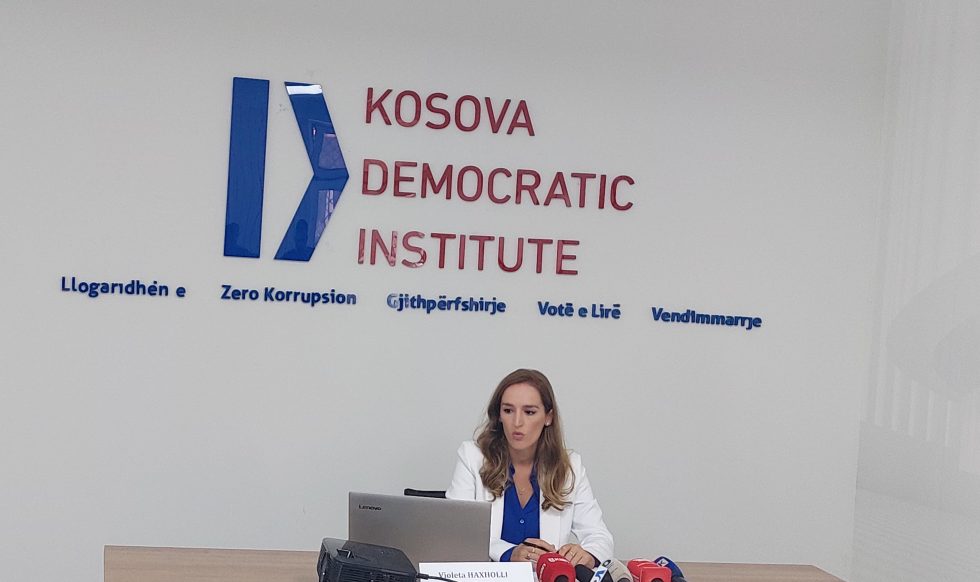


The Kosovo Democratic Institute (KDI) held today a press conference relating the Kosovo-Serbia dialogue, whereby presented a brief analysis on this issue, titled “Kosovo-Serbia dialogue: One step forward, three steps back”.
This analysis focuses on the three aspects of the dialogue between Kosovo and Serbia, the need for progress towards the final agreement, the need for the development of internal dialogue with the Serb community in Kosovo, as well as the need for increased transparency and accountability of the Government towards the Assembly and the general public relating this process.
On this occasion, Violeta Haxholli from KDI emphasized that the continuation of dialogue between Kosovo and Serbia remains an important factor for Kosovo’s foreign policy in particular, but also for the stability in the region in general.
She added that, although Kosovo and Serbia have been negotiating under the EU platform for more than a decade, the idea of ??discusions and final epilogue still remains unclear. Despite the numerous agreements during the first half of the process, the dialogue has produced ambiguity, while the two countries have not yet reached a final agreement. Discussions within the dialogue were conducted mainly on technical topics, which have been discussed again and again depending on the developments on the ground.
Haxholli stressed that, since the dialogue meetings resumed in Brussels, after the election of the new Government in Kosovo, topics that have been discussed for more than a year were: freedom of movement, specifically the issue of vehicle license plates, energy and the issue of missing persons. After many efforts, the parties have agreed about a roadmap for the implementation of agreement on energy, while there is still no agreement on freedom of movement and missing persons. On the other hand, the new agreement on energy roadmap seems to be followed by the same practice of non-implementation. This is because Serbia has not implemented the points of the roadmap according to the established deadlines. This situation will force the parties to discuss this issue again.
Meanwhile, are many topics that still need to be agreed upon between the parties, while it is also necessary to discuss agreements that have been reached many times, but have not been implemented in practice, such as e.g. agreement on diplomas, IBM, etc.
Haxholli said that dialogue meetings are now being held only as a reaction to the developments on the ground, such as August 18 meeting, after the Government’s decision regarding the agreement on freedom of movement. While, it seems that there is no political will of the parties to move forward towards the final agreement, even though this remains a requirement and criterion of the European Union for both countries to move forward towards integration processes.
Parties must resume discussions on the elements of this agreement as soon as possible, in order to come closer to the final solution, which would then have a domino effect on the resolution of technical issues. Otherwise, lack of political will to move forward towards the final agreement, will continue to reflect on the situation on the ground, maintaining an unstable status quo that occasionally produces tensions.
Parallel to the continuation of the dialogue process, Haxholli added that the Government should put into practice the long-standing idea for an internal dialogue with the Serb community living in Kosovo. This is with the aim of increasing communication and cooperation between the institutions of Kosovo and this community, with the aim of guaranteeing their sustainable integration in the state of Kosovo. Regarding the Government’s decisions affecting citizens of this community, the Government should organize systematic information campaigns on the ground that go beyond posts on social networks. In this view, there should be cooperation with Serb community municipalities for the distribution of information to this community.
In terms of transparency and accountability of the dialogue process, Haxholli underlined that the Government should increase the transparency and accountability of the dialogue process towards the Assembly and the public, by increasing the number of reports to the Assembly on its own initiative and by facilitating access of the public to information about the dialogue for the public on the official website. Hence, there should be systematic reporting of the Government’s high representatives regarding the meetings held within the dialogue process, including the last meeting. Meanwhile, updated reports on the situation with implementation of the dialogue agreements should be drafted as soon as possible and be shared with the Assembly and the public.
This press conference was carried out in the framework of the project “Civil societies in Kosovo and Serbia promote a participatory and meaningful reconciliation process”, supported by the Italian Ministry of Foreign Affairs and International Cooperation.